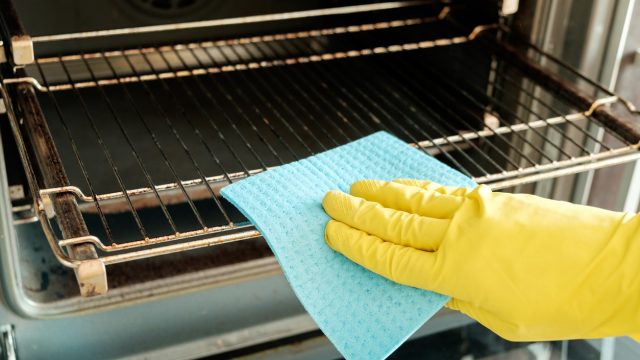This Is the Safest Way to Clean Your Oven

While you probably give your countertops a regular wipe-down, not every part of the kitchen gets such a thorough treatment. Ovens are particularly easy to neglect, sometimes for years at a time. With regular use, they build up messes that can be tough to clean. However, the one thing worse than those stuck-on messes are the cleansers used to eradicate them. Unfortunately, most conventional oven cleaners are full of dangerous chemicals. According to a study published in Clinical Pediatrics, oven cleaner was responsible for 23 percent of a group of children who suffered injury from ingesting corrosive materials. Scarier still, the Annals Of Emergency Medicine reports a case of severe burns to the face just from coming into contact with aerosol oven cleaner.
Because of the high risk of injury, or even death, from conventional oven cleaners, many people choose not to have them in their homes. Even products marketed as “natural” sometimes include warning labels indicating that the products are corrosive, making them just as dangerous. Your oven’s self-clean feature can also be harmful to people and pets, meaning it’s only potentially safe for extremely well-ventilated kitchens. In fact, research published by the California Environmental Protection Agency Air Resources Board, self-cleaning functions increased particulate matter, as well as amounts of formaldehyde, nitrogen dioxide, and carbon monoxide in indoor air.
So, how can you clean your oven safely? A mixture of baking soda and vinegar is a popular natural option for cleaning ovens. Unfortunately, it’s not entirely without risk. Mixing acidic and basic ingredients can create a powerful cleaning agent, but it can also be explosive if done improperly. Luckily, there are heavy duty cleaners suitable for ovens that do not contain toxic ingredients. Options like Thieves Household Cleaner and Method Kitchen Degreaser are non-corrosive and do not pose serious health risks. Non-toxic cleaners also use essential oils to cut through grease which give off a pleasant aroma. A little lemon-verbena definitely beats the noxious fumes from chemical products or high-temperature self-cleaning.
Once you have a good quality non-toxic cleaner, it’s time to prep the oven. Start by removing all racks and any other equipment, like pizza stones and thermometers, along with larger pieces of debris. Once the oven is clear, spray on a generous amount of cleanser and let it sit for two to twelve hours, depending on how dirty it is. It’s ok to let it sit overnight. Once ready to scrub, arm yourself with rubber gloves and a metal scouring pad or brush to scrub any areas that have stuck on grime. Once thoroughly scrubbed as needed, wipe down the oven with damp rags or paper towels. If there are any remaining spots of baked on grime, spray them generously with cleanser. Let the product sit for at least 15 minutes and scrub clean. Wipe down the oven again with damp towels until it looks practically brand-new. Now that the oven is squeaky clean you can celebrate by using it to Cook A Steak At Home Like A Pro.
To discover more amazing secrets about living your best life, click here to sign up for our FREE daily newsletter!